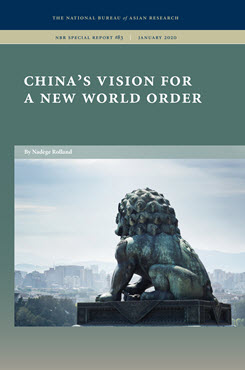NBR Special Report no. 83
China's Vision for a New World Order
This report lays out the intellectual and ideological underpinnings that inform China’s vision for a new world order and examines the process of transition from thought into concrete policymaking.
EXECUTIVE SUMMARY
MAIN ARGUMENT
Under Xi Jinping, China has become more vocal about its dissatisfaction with the existing international order. Whereas its posture used to be mostly defensive, it has recently engaged in a more forward-leaning, assertive effort to reshape the system. Xi is confident in China’s growing material power but is aware that the country still lacks “discourse power”—the ability to exert influence over the formulations and ideas that underpin the international order. Although the Chinese leadership has mobilized intellectual resources to fill this gap, it has not explicitly laid out an alternative vision of what the world should look like. However, a close reading of ongoing internal discussions and debates suggests that China’s vision for a future system under its helm draws inspiration from traditional Chinese thought and past historical experiences. The collective intellectual effort reflects a yearning for partial hegemony, loosely exercised over large portions of the “global South”—a space that would be free from Western influence and purged of liberal ideals. The contours of this new system would not be traced along precise geographic or ideological lines but be defined by the degree of deference that those within China’s sphere of influence are willing to offer Beijing.
POLICY IMPLICATIONS
- The Chinese leadership’s efforts to increase China’s discourse power should not be dismissed or misconstrued as mere propaganda or empty slogans. Rather, they should be seen as evidence of the leadership’s determination to alter the norms that underpin existing institutions and put in place the building blocks of a new international system coveted by the Chinese Communist Party.
- The Chinese leadership’s critique of the existing international order reveals its unswerving objection to the values on which this order has been built. At stake is not only the predominant position of the U.S. in the current system but more importantly the potential erosion of fundamental human rights, freedom of thought and expression, and self-government around the world.
- The Chinese Communist Party seems to envision a new world order in which China enjoys only partial hegemony rather than rules the world. Nonetheless, a dual-centered system could eventually materialize in which emerging and developing countries may yet again become the battleground for global influence among great powers.




